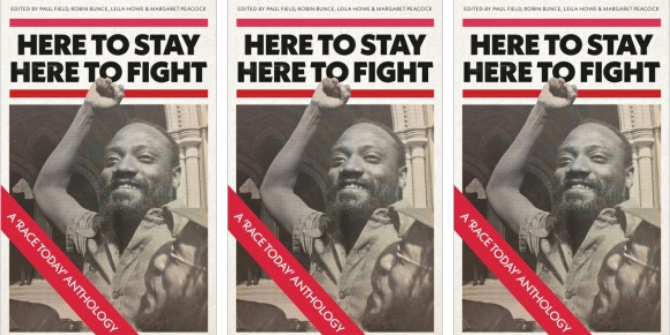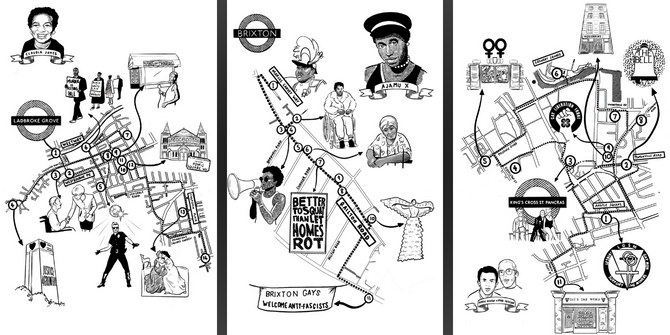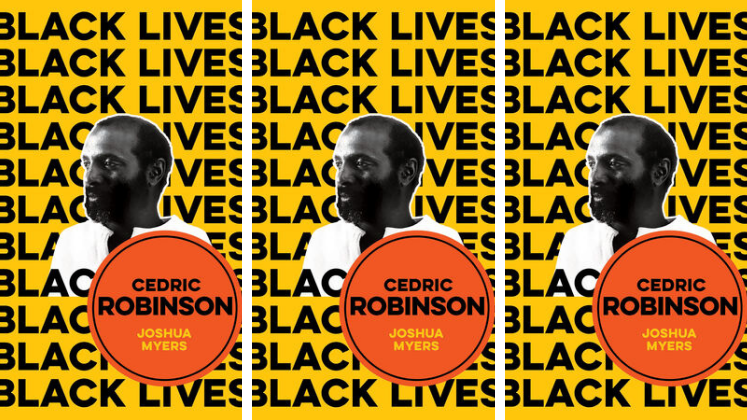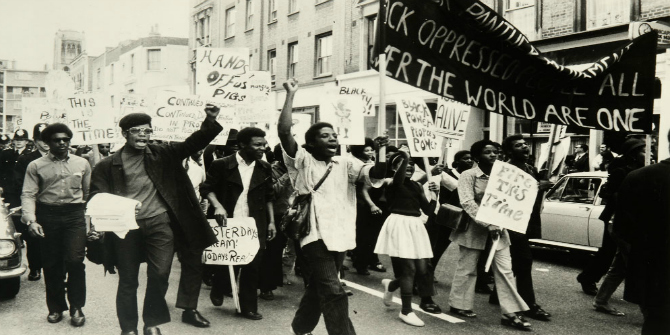In an excerpt from the preface to Speak Out!: The Brixton Black Women’s Group, editor Milo Miller shares context about the group and the impetus for the book which brings together, for the first time, the writings of one of Britain’s pioneering Black radical organisations of the 1970s.
Speak Out!: The Brixton Black Women’s Group. Brixton Black Women’s Group; Milo Miller (ed.). Verso. 2023.
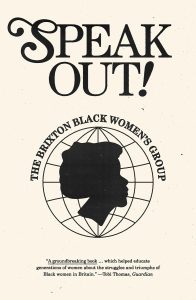 The Brixton Black Women’s Group (BBWG), which formed in 1973 and lasted until 1989, was a Black socialist feminist organisation based in Brixton, south London. It is thought to be the first autonomous Black women’s group of its kind to be established in London, and to be among the first in Britain more broadly (indeed, it was initially known simply as ‘the Black Women’s Group’).
The Brixton Black Women’s Group (BBWG), which formed in 1973 and lasted until 1989, was a Black socialist feminist organisation based in Brixton, south London. It is thought to be the first autonomous Black women’s group of its kind to be established in London, and to be among the first in Britain more broadly (indeed, it was initially known simply as ‘the Black Women’s Group’).
The [Brixton Black Women’s Group] was central to radical struggles against racism, fascism, sexism and class oppression in London and beyond
The group was central to radical struggles against racism, fascism, sexism and class oppression in London and beyond, organising extensively around the policing and criminalisation of Black people, reproductive justice, housing, labour, legislation on immigration and nationality, education and more. The BBWG worked closely with other community groups and organisations; it was also actively part of networks of women’s groups nationally and internationally. It was instrumental in establishing the Organisation of Women of Asian and African Descent (OWAAD), which existed between 1978 and 1983 and was the first national Black women’s organisation in the UK.
Political Blackness […] was understood as encompassing all those exploited in Britain through historical and modern forms of colonialism, imperialism and racism. “Blackness”, in this sense, functioned as a site of active and relational re/articulation; as a site of resistance, of solidarity and of coalition.
Crucially, the BBWG organised on the grounds of political Blackness. “Blackness”, in this formulation, was not understood as a descriptive category referring, for example, to “race” or skin colour; rather, it was understood as encompassing all those exploited in Britain through historical and modern forms of colonialism, imperialism and racism. “Blackness”, in this sense, functioned as a site of active and relational re/articulation; as a site of resistance, of solidarity and of coalition. This conceptualisation of Blackness was prevalent (though far from settled or uncontested) in Britain’s Black Power movement in the 1970s and 1980s, and the BBWG’s members, accordingly, included women from and with ties to the Caribbean, Asia and Africa. This approach was central to – and further developed by the BBWG’s critical involvement in – OWAAD, which explicitly marked it by referring to women of Asian and African descent in its name.
Along with the Mary Seacole Craft Group, the BBWG established the Mary Seacole House, later renamed the Black Women’s Centre, in 1979. For much of its existence, the centre was managed by the BBWG. It became a focal point for the meeting of women’s groups and political organisations working across London. The centre hosted a regular legal and welfare rights information and referral service; a craft workshop; a health group providing, among other services, advice on contraception and pregnancy; a crèche; children’s activities during school holidays; and a library and resource centre specialising in women’s literature and Black history. In the aftermath of the April 1981 Brixton Uprising, the centre also functioned as the headquarters of the Brixton Defence Campaign’s Legal Defence Group.
The BBWG’s newsletter, Speak Out […] contained reports on the BBWG and other grassroots groups’ work on a variety of fronts, in-depth political position statements, analyses of proposed legislation, explainers on health issues and accounts of liberation struggles across the Global South.
The BBWG’s newsletter, Speak Out, detailed all of this. It contained reports on the BBWG and other grassroots groups’ work on a variety of fronts, in-depth political position statements, analyses of proposed legislation, explainers on health issues and accounts of liberation struggles across the Global South. Alongside these, there were poems and illustrations by BBWG members, as well as reviews of plays, films and novels – emphasising the group’s understanding of culture and political struggle as inseparable, and of art and self-expression as integral to movements for liberation. Collectively written pieces – on, for example, the issues the group organised around, the coalitions the group was part of, and the group’s political positions – appeared in publications such as Race Today, Spare Rib, Red Rag and Feminist Review.
This book brings together, for the first time, all of the issues of Speak Out as well as statements, articles and book chapters written by the Brixton Black Women’s Group.
Over the years, many individuals and groups have devoted a considerable amount of effort to honouring the BBWG’s work – not least the writers of the landmark 1985 book The Heart of the Race: Black Women’s Lives in Britain. The first sustained account of Black women’s history in Britain written by Black women, The Heart of the Race was written by BBWG members Beverley Bryan and Suzanne Scafe with OWAAD co-founder Stella Dadzie, and features an extended section on the BBWG. Elsewhere, Dadzie’s personal papers, held at the Black Cultural Archives in Brixton, have long included the most comprehensive collection of BBWG documents available. Despite efforts by a great many people, however, the wealth of writing produced by the BBWG has remained scattered and often difficult to access. This book brings together, for the first time, all of the issues of Speak Out as well as statements, articles and book chapters written by the Brixton Black Women’s Group. It also contains other hard-to-access archival material essential to understanding the group’s work and trajectory.
Why wasn’t the group’s trailblazing work as celebrated as it deserved to be and available as a resource in combatting current, seemingly intractable and ever-intensifying crises?
The research culminating in this book began in 2016, as part of my work on my PhD thesis, which focused on squatting in Brixton from the 1970s to the 2010s. During my PhD, I began compiling as much of the BBWG’s writings as I could find, in addition to writing by individual members of the group. I visited archives and typed up issues of Speak Out, as well as leaflets produced by the group; I tracked down out-of-print books and journals, typing up chapters and articles written by the group or by individual members. Initially, this was solely so I could easily revisit this writing and quote from it as needed in my thesis; over time, however, this gathering of the BBWG’s writing became a project in its own right, as the group’s visionary work speaks urgently to the conditions we face in the present. I began to share the material I was collecting with friends, whose excitement was palpable. Many of them had never heard of the group; some had but had never encountered the group’s writings. My own excitement was beginning to be mixed with frustration: Why wasn’t this material more widely known and accessible? Why was the Brixton Black Women’s Group so absent from accounts of any number of key political issues, campaigns and events in 1970s and 1980s Britain to which they were central? Why wasn’t the group’s trailblazing work as celebrated as it deserved to be and available as a resource in combatting current, seemingly intractable and ever-intensifying crises? It became very clear: the collected writings of the Brixton Black Women’s Group had to be published.
With this in mind, from 2017 onwards I worked on this collection whenever I could. I continued typing up articles and chapters; I tracked down an elusive Speak Out issue; I found photos of the Black Women’s Centre; I carefully removed photocopier static from images in issues of Speak Out. In November 2020 I contacted members of the BBWG and sent them what I had put together, with the offer to take this forward should they be willing. Meticulous discussions then took place between us: What should the scope of the book be? What material was perhaps beyond that scope, and what material had yet to be included? Members looked to their personal archives and sent me more material to include, from leaflets and statements to photographs.
The year of this book’s publication – 2023 – marks fifty years since the Brixton Black Women’s Group was founded.
The year of this book’s publication – 2023 – marks fifty years since the Brixton Black Women’s Group was founded. As fascism sees a resurgence around the world, as the struggle against police brutality and racism must continue unabated, as attacks on reproductive rights and bodily autonomy rage on and as border regimes and capitalism continue to exact their deadly toll, the work and legacy of the Brixton Black Women’s Group remain as vital and necessary as ever. This book is offered in the hope that it might provide tools to not only understand and confront this current conjuncture but also prefigure and enact practices of mutual aid, solidarity and resistance so urgently needed to overcome it. It is offered in the hope that it might provide tools to imagine a radically different world; a world beyond the brutal entanglement of conquest and empire.
Note: This excerpt from the introduction to Speak Out!: The Brixton Black Women’s Group by the Brixton Black Women’s Group, edited by Milo Miller, is copyrighted to Verso Books, and is reproduced here with their permission.
This post gives the views of the author, and not the position of the LSE Review of Books blog, or of the London School of Economics and Political Science. The LSE RB blog may receive a small commission if you choose to make a purchase through the above Amazon affiliate link. This is entirely independent of the coverage of the book on LSE Review of Books.
Image Credit: Some members of the BBWG in 1979, courtesy of Milo Miller/Verso.



